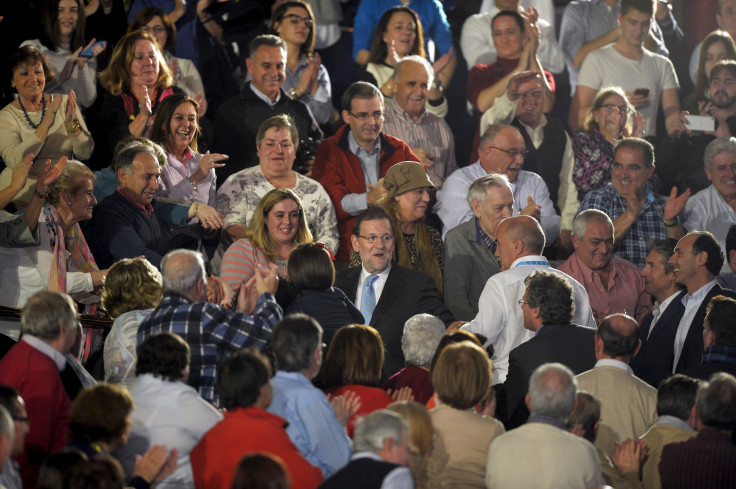Spain Elections 2015: Popular Party Wins Greatest Influence, But National Government Is Poised For Fractured Future

The Spanish parliamentary elections seem poised to shape a fragmented and uncertain future for the country’s government after Sunday voting gave the center-right Popular Party the biggest bloc of influence with just under a third of the votes. That third is the largest segment of the governing body; however, it appears unlikely it will yield a stable majority in the next four years, the Financial Times reported.
With more than 90 percent of the ballots counted, the Popular Party won 28.7 percent of the vote, followed by the Socialists with 22.19 percent. The left-wing Podemos Party placed third, followed by the centrist Ciudadanos Party, seen as the most likely ally to Prime Minister Mariano Rajoy's Popular Party, Agence France-Presse reported.
#BREAKING Spain's Popular Party "has won election," says deputy PM #EleccionesGenerales2015
— Agence France-Presse (@AFP) December 20, 2015Whatever government emerges, and the political alliances that may be forged in coming years, it will face some very real challenges. Rocked by a series of corruption scandals in recent years, the country now faces a 22 percent jobless rate and concern that stable, well-paid jobs may be scarce. The country has experienced an economic resurgence recently, and the economy is expected to grow by 3 percent in the coming year.
Spain’s lower house of Parliament has 350 seats in total, and the Popular Party is expected to take somewhere between 114 and 124 of those positions. That relatively weak showing will make it difficult for the ruling party to pass the legislation it would like to see ushered through, the Guardian reported. Analysts said should current polling prove to be accurate, Spain’s government will be predominantly socialist. The so-called losers could, of course, band together to form their own majority ruling bloc, similar to what happened recently in Portugal.
The winning party is short more than 100 votes to wield an absolute majority in Parliament, making it uncertain how exactly the Popular Party will proceed.

The expected results from the 2015 parliamentary elections contrast with those four years ago when Rajoy and the Populist Party dominated the elections and won 44 percent of the vote. The country was facing a deep debt challenge at the time in addition to high unemployment and slow national growth. That election put an end to the dominance of the Socialist Party, which had been in charge since 2004 when the nation was rocked by terrorist attacks in Madrid. In those attacks, bombs packed with nails and dynamite were detonated on trains in the city, killing 191 people and injuring 1,800 more. Those attacks were some of the worst terror attacks by Islamic extremists in European history. They also divided the country politically , and three days later the Popular Party lost its place at the head of the government.
Spain’s economic woes have been a persistent concern for creditors, who are worried the country could default on its loans. Spain, alongside countries like Italy and Greece, have been very close to default, and if that scenario became a reality, some analysts say unrest could lead to the collapse of the European Union.
© Copyright IBTimes 2025. All rights reserved.





















